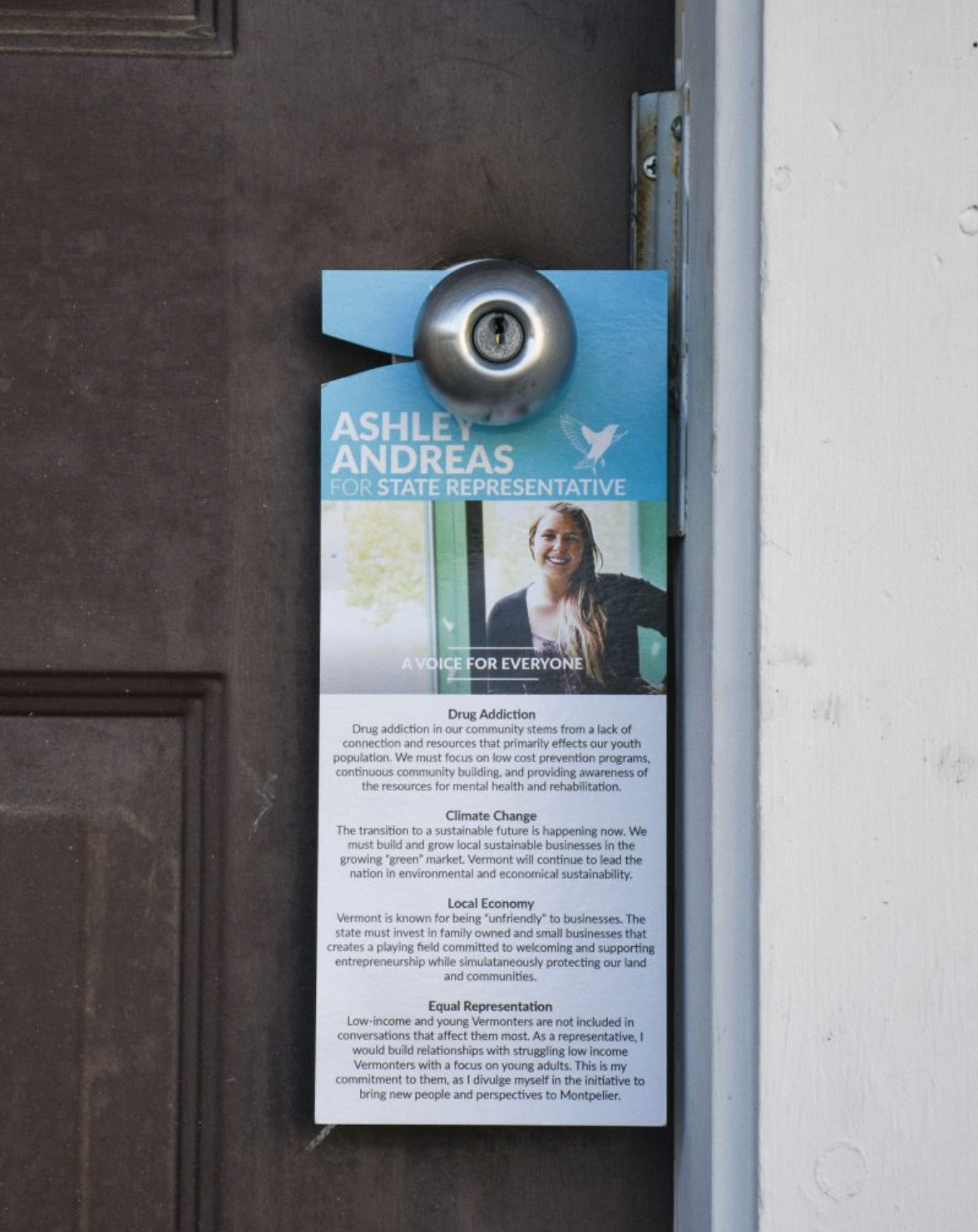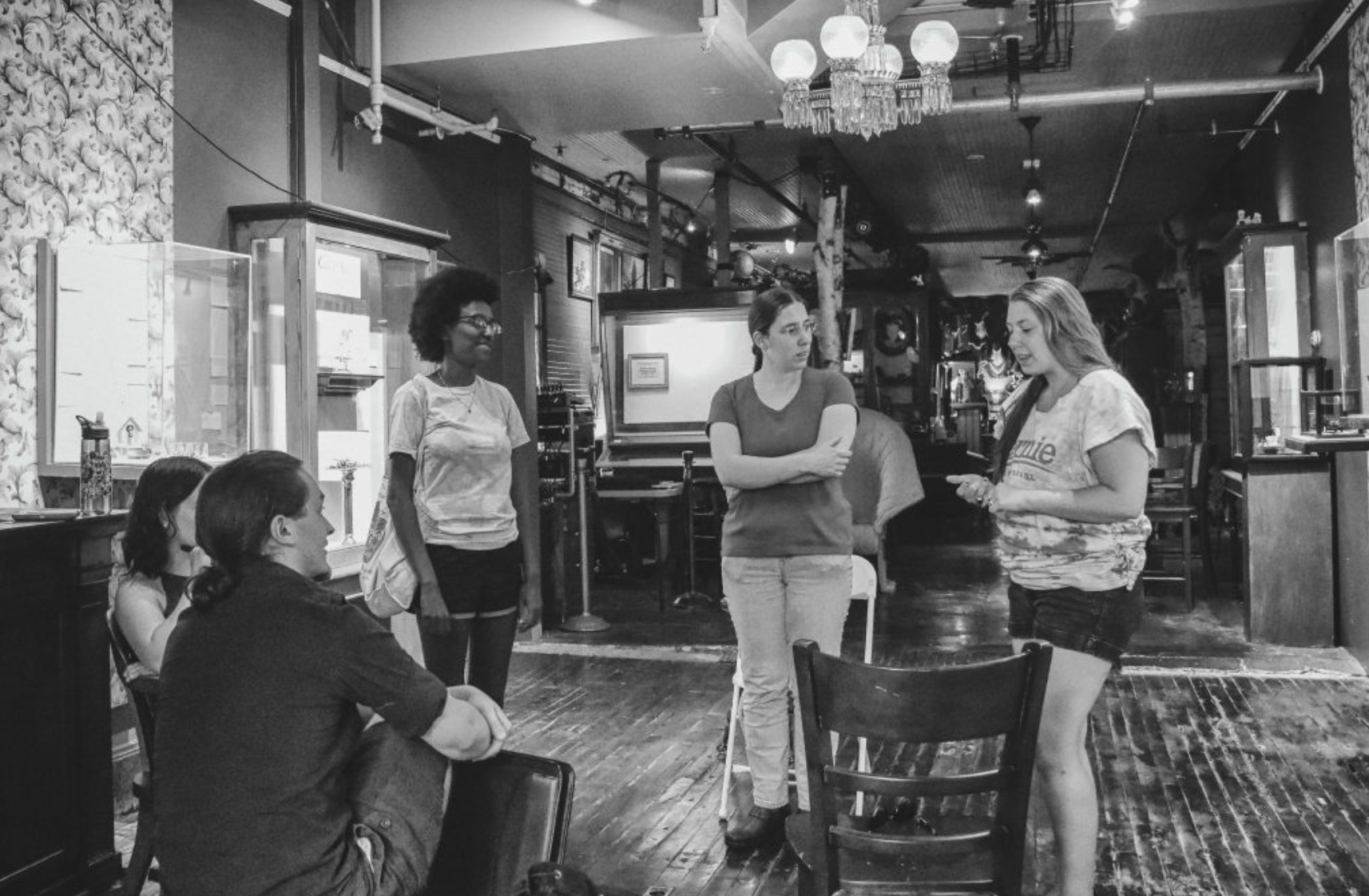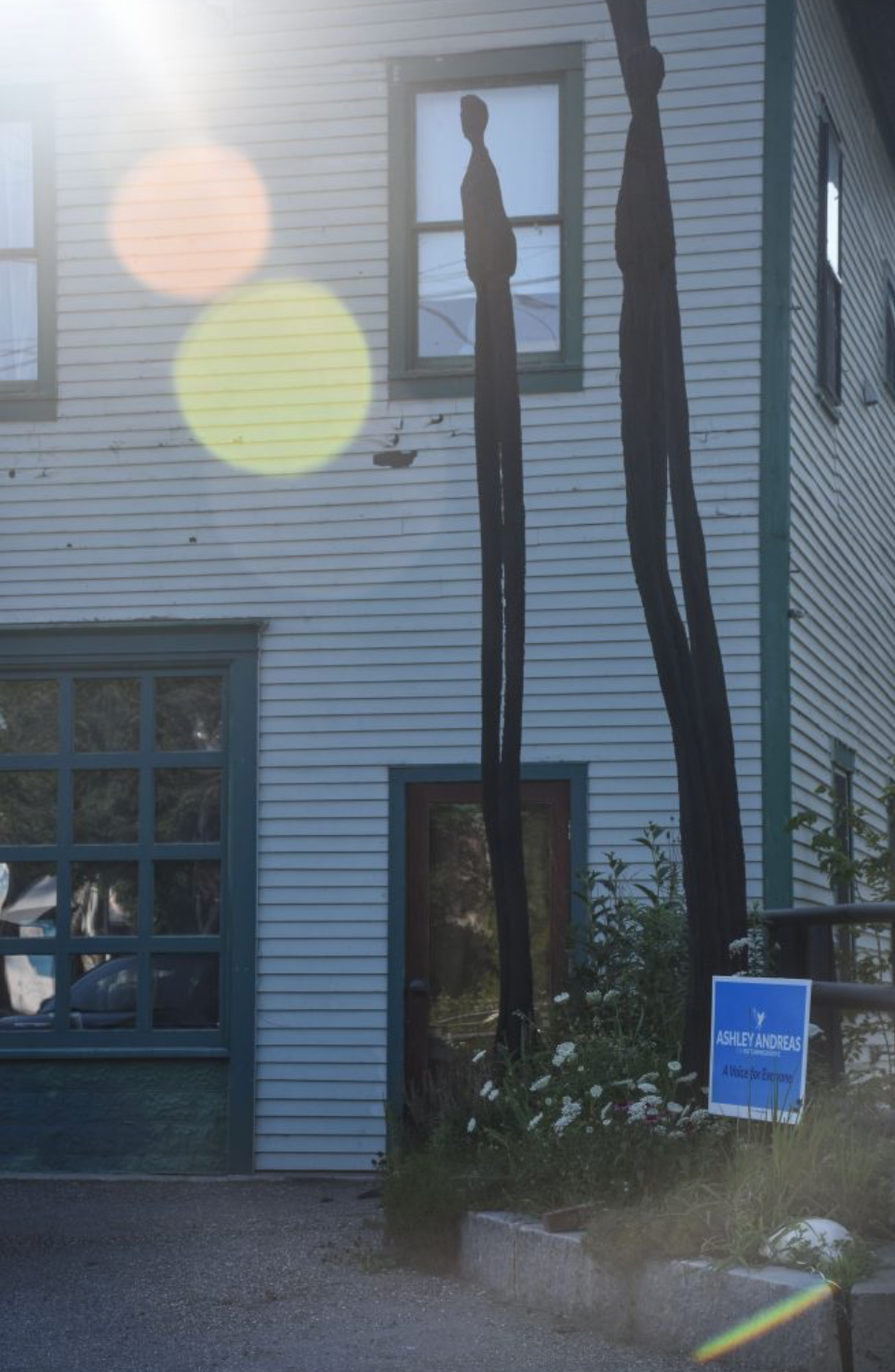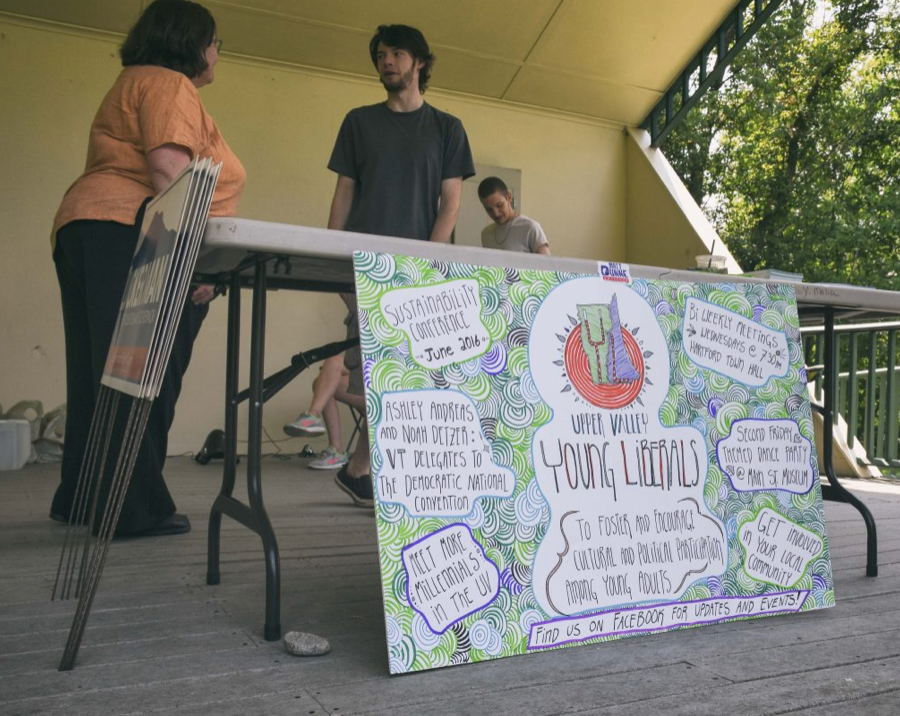After Senator Bernie Sanders publicly endorsed Hillary Clinton for the Democratic presidential nomination, many supporters lost faith in his promise of political revolution. Not Ashley Andreas. The 23-year-old Hartford resident—and pledged delegate for Sanders—is running a competitive primary campaign for a seat in the Vermont House of Representatives. Here she discusses her life-changing experience with the Occupy Wall Street movement, her frustration with establishment politics, and how she manages to juggle her responsibilities as a single mother, work-study student, and first-time Democratic-Progressive fusion candidate.
Why did you decide to run in the Democratic primary?
The formation of the Upper Valley Young Liberals had a lot to do with it. Part of our goal is to encourage young people to participate in politics, and no one was running against the incumbents in my district—there actually hasn’t been a primary race here in over ten years. Running for office sets an example for people my age to stand up, pay attention, and participate. It’s important to send a message on a local and national level that we’re ready to address the real issues—we’re not afraid of them, and we know that we can solve them. My daughter, Daliah, also had a lot to do with my decision to run.
How did she influence your campaign?
I’m an environmental science student, and I worry that if we don’t do something drastic to back pedal on pollution, on burning fossil fuels, and on how we treat our soil, then we’re going to have a really hard time surviving as a human race. I don’t want my daughter to grow up in an apocalyptic environment with food shortages because of climate change. I spent my childhood outdoors, running around in the forest, swimming in the rivers. Is my daughter going to be able to enjoy these same freedoms and resources? My fear is that if we continue on the path that we’re currently on with establishment politics, then the answer is no.
Did you grow up in Vermont?
I’m originally from Pennsylvania. My parents separated when I was a baby. My mom had a stroke when I was five, and I went to live with her after that. She didn’t have the ability to make great decisions or stay healthy, so we ended up in a women’s shelter. One day my aunt heard a presentation about the Milton Hershey School and thought it would be great for me. It’s a boarding school that was originally set up for orphans. I applied and they did an emergency enrollment because of the situation I was in at the time.
Did you live at Milton Hershey full time?
Yes, besides breaks for Thanksgiving and Christmas. In the summer they have a program where you can do different camps every week with lots of interactive and stimulating activities. I went to Bible camp two years in a row—it was held on the beach. By the second year I found ways to skip out on the mass.
Given the population of students at the school, did they provide you with extra support services?
They gave us clothes, food, school supplies, and an allowance. If you wanted to work, they provided transportation to your job. Each student got a career counselor to help with applications and college visits. We also got to visit Hershey Park for free!
They gave us clothes, food, school supplies, and an allowance. If you wanted to work, they provided transportation to your job. Each student got a career counselor to help with applications and college visits. We also got to visit Hershey Park for free!
How did you end up here in Hartford?
After high school I went to Millersville University and really didn’t do well there. By the third semester I had fallen by the wayside—I didn’t have a major or any adult mentors, and I had no direction in life. I was surrounded by other kids who were just as lost and confused, I started drinking and partying, and I got really off-course. I ended up moving down to Florida with my daughter’s father—she hadn’t been born yet, obviously—but it was not the best place to live, so we moved up to his house in Quechee in 2012. I fell in love with Vermont, and now I’m never going to leave.
When did you develop your passion for politics?
My family is conservative, and I always had this deep feeling of dissatisfaction with their beliefs. The Iraq War began when I was in sixth grade, and I really started becoming more aware of what was happening then—I was completely opposed to it.
How did your family feel about the war?
They were very Donald Trump-esque about it, with the whole “let’s nuke ’em all” mindset. I felt that was so wrong. When I got to high school I started taking an interest in national politics. And then, in 2011, I went to Occupy Wall Street.
What motivated you to go to Zuccotti Park?
I was watching the news one day when I was 19 and I saw a short clip of hippies camping in New York City. I had no idea what Occupy Wall Street was, but as soon as I found out, I decided to skip school and left immediately with two friends. It was late at night when we first got to Zuccotti Park, and a kind woman taught us how to make bedding by gathering tons of cardboard—you need at least three inches of cardboard or you’re going to be in so much pain when you wake up. My car got impounded, but it was still the coolest experience of my life. We stayed there for six days and ended up making so many friends. I cried a lot the night before we had to leave. I felt so at home sitting there in the middle of the park with all those strangers.
What made you feel that way?
I found my people there. It was a reassurance that I was not alone, that I was not crazy, that I was not stupid. Until then I was made to feel like I was wrong about everything in my whole life—not just politically, but down to how I lived my life and viewed the planet. My family never agreed with me on anything, and my friends never really cared about those issues. Occupy Wall Street gave me hope that things could get better and that not everyone was asleep. The energy there was incredible.
How did you get involved with Bernie Sanders’ presidential campaign?
I didn’t even know who he was until I moved up here, and then I fell in love with him. When he finally announced that he was running for president, I was mind-blown. I was in school full-time and working part-time then, so I was only able to do a couple phone banks, and I held an event at the Main Street Museum to support his campaign last July.
What was it about him, specifically, that made you so excited?
His honesty. You can go on YouTube and type in “Bernie Sanders 1986” or “Bernie Sanders 2001”—all the way up to 2016—and you’re going to find the same man, the same message, the same passion. You’re also going to find the establishment ignoring him, walking away from him, belittling his ideas.
Did Bernie play a role in your decision to run in the local primary?
Before he came along, I had neither hope nor trust in any politician on a national scale. He was the first to speak about issues—like our rigged economy—that people used to call me a conspiracy theorist for talking about. He brought morals back to politics. To get to the point where he was a very viable candidate was so encouraging, and it made me feel like I was morally obligated to do what’s right. He also inspired me to join the Upper Valley Young Liberals earlier this year.




How did that group come about?
After the presidential primaries ended in New Hampshire and Vermont, the Bernie office volunteers were still riled up about organizing, canvassing, and trying to fight for a political revolution. Nick Clark decided to start the Upper Valley Young Liberals so these people could stay engaged with politics on a local level. It’s meant to be a community of like-minded people who come together to socialize, organize, and work for the greater good. Nick also had the idea of having young people run for office, and he asked me to do it. At first I just laughed—I didn’t know how to run a campaign—but then I really thought about it, went home, watched some Bernie videos, and I decided I would do it.
You share many of the same positions as the other candidates in the Democratic primary—what sets you apart as a viable option for voters?
Number one would be my age. Millennials have a different perspective on life than older generations. There are a lot of things that are no-brainers for us—gay rights, racial equality, healthcare for all, marijuana legalization. These are not the days of Reefer Madness. People no longer believe that marijuana is more dangerous than alcohol. Also, I have been poor. I’m still poor. Young, low-income, and working class Vermonters don’t really have much representation in the state house. As a low-income person, I can give perspective on how legislation is going to affect my community and other people who are in similar situations to mine. I’m also running as a Democratic-Progressive fusion candidate.
How has your campaign been going?
So far, it’s been a completely positive experience. Between going to school, being a mom, having a job, running a campaign, being a delegate to the convention, and being vice chair of Upper Valley Young Liberals, it’s a huge time commitment, but this is the happiest I’ve ever been in my entire life, hands down. And I don’t know what I would do without my friends—everybody’s been so collaborative, helping out with canvassing and organizing and cooking and babysitting.
Do you ever sleep?
I could probably cry thinking about it…last night I went to bed at 4:30 a.m. and then had to wake up at 7:30.
What are some of the major concerns you’re hearing from other young Vermonters in your district?
The biggest thing is not even policy-related, it’s that young people feel that they don’t have any representation. They don’t even know who our current reps are. They’ve never been invited to the conversation, and for that reason they’re apathetic about politics. Another issue everyone is concerned about is taxes—the property taxes are extremely high in my district. We have to find a way to include everyone in the conversation about why the taxes are so high and what the strategies are that could possibly change that. No normal person has the time to go sit in the state house, so we need to bring the state house to White River.
What do find most frustrating about local politics?
People want to vote for who they know, and they don’t evaluate the candidates. I think it’s really important for people to know what their options are, what the differences between the candidates are, and then factor in how they can beat the Republican opponent.
You were recently selected as a delegate to the Democratic National Convention—now that Bernie Sanders has publicly endorsed Hillary Clinton, are you still planning to support him in Philadelphia?
Bernie told us on a conference call that he has not suspended his campaign, he will not suspend his campaign, and that it’s more important than ever for every single Bernie Sanders delegate to show up at the convention and vote for him. I can see why many people who aren’t so close to this process are discouraged by the media and why they’re supporting Jill Stein now. It was frustrating to see “Bernie or Bust” people posting about Jill Stein after the endorsement.
Has your daughter been following along with any of this?
Daliah loves Bernie Sanders. If you ask her what Bernie says, she’ll say “Enough is enough!” The day that Bernie endorsed Hillary, she asked me what was wrong and I told her, “I’m sad, Daliah. I don’t think that Bernie is going to be president.” She was like, “Only Hillary Clinton?!” I said, “Or Donald Trump.” And she just had the saddest face.
What would Hillary Clinton have to do to win your support?
It might be too late. She could give her word that she would do everything in her power to stop the Trans-Pacific Partnership. That would be number one. She could change her stance on fracking and universal healthcare. Something that would mean a lot to me and to other Bernie supporters is for Hillary to address voter suppression and election fraud, to talk about what happened during the primaries and to hold people accountable.
Throughout the Democratic presidential primary, there’s been a lot of gender-baiting and essentialist arguments based in identity politics—for example, the comments made by Madeleine Albright and Gloria Steinem denigrating young women who support Bernie. How do you respond to these types of comments?
“Vote for me because I’m a woman and you’re a woman. You have to—or you don’t support women!” That is the most sexist argument on the planet. I lose respect for women who specifically campaign on their gender. Your skill set and your experience qualify you for a job, not your gender. To try to use gender or race or ethnicity or anything like that as a basis for why you deserve something defeats the purpose of equality. It’s the opposite of creating an equal playing field. I’ve actually been really amazed by the number of women I’ve met locally who are are supporting women in politics just because of their gender. That’s frustrating. We should be looking at the real issues and the capabilities of each candidate.
What do you plan to do after August 9th if you lose the Democratic primary?
I’ll continue with everything I’ve been doing, besides running the house campaign. I’m excited that I now have such a close relationship with two of my local legislators. There are a lot of issues that need to be addressed in our community. We are struggling with the opiate epidemic, just like the rest of the state, and I personally know a lot of people dealing with addiction. We need to start looking at preventative programs—we can put in as many methadone and suboxone clinics as we want, but they’re not the most effective methods of actually getting people sober. We need to think about how we can stop the problem before it starts, rather than trying to clean up a huge mess with more drugs.
Any final comments?
It’s important for all young people—whether tired, single moms like myself, or young people who might be unhappy with their jobs and may be thinking about leaving the state—to get more involved. Run for office!
To learn more about Ashley’s campaign, visit Ashley Andreas for VT State Representativeand the Upper Valley Young Liberalson Facebook.
About the Author/Photographer:
James Napoli is the founder of Junction Magazine. James has since moved to Minnesota and all content is managed by a collective of artists. Read more about them here.
